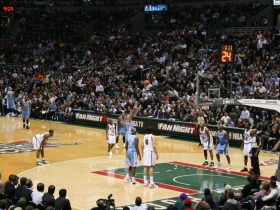Will Herb Kohl Blackmail Milwaukee?
The Bucks need a new arena. Time to start threatening to move the team.

The Milwaukee Bucks
Back in mid-1990s, when Bud Selig was trying desperately to convince taxpayers to build him a new stadium, he brought the devil incarnate, Atlanta Braves owner William Bartholomay, to Milwaukee. This was the man who had bought the Milwaukee Braves in the 1960s and then moved the team to Atlanta, despite the fact that Milwaukee had for years been the National League’s top-drawing team. Bartholomay had broken the hearts of Milwaukee’s baseball fans, including Selig, who was outraged by the move.
But 30 years later, Selig brought Bartholomay to Milwaukee to warn people they could lose their team again if they didn’t pony up tax money for a new ballpark. It was an ugly moment, truly revealing how Selig had changed over the years, and a brilliant example of how the game of civic blackmail is played by major league teams.
Now Herb Kohl, Selig’s friend since they were boys, faces the same issue. Kohl has periodically made it clear the Bucks need a new arena, and has suggested government help is needed. But as a U.S. Senator, he could hardly threaten to move the team. Kohl, however, will soon be retiring, and could — though he seems a far more reserved and gentle person than Selig — try to emulate his friend in blackmailing Milwaukee.
The example of the Seattle Supersonics stands as the obvious warning. This great franchise won the 1979 NBA championship with a team that included two of the best Milwaukee-raised basketball players in history, forward John Johnson and guard “Downtown Freddie” Brown. But after Seattle refused to build a new arena with an estimated price tag of $500 million, the team moved to Oklahoma City in 2008.
Is there a city that wants an NBA franchise and is willing to spend a half billion on a new arena? If we start hearing of one, you will begin to see the squeeze put on Milwaukee taxpayers.
In addition, the old MECCA arena, then run by the city, was required to hand over 15 percent of all proceeds from its bookings to the Bradley Center for the new facility’s first 10 years of operation. This protected the Bradley Center from competition, allowing it to funnel more revenue to the Bucks while reducing revenues for MECCA arena and thereby increasing its costs for city taxpayers. All told, former Mayor John Norquist once estimated, the total subsidy for the Bradley Center might have been as high as $50 million. In short, the taxpayers may have paid more than one-third of the costs for this “free” arena.
Many of the details on this were very hush-hush, and we’re seeing the same sort of secrecy in the effort to gain more revenue to the Bucks. In May, the Metropolitan Milwaukee Association of Commerce announced it had secured a six-year commitment of $18 million from a long list of local businesses to support the Bradley Center.
The biggest contribution was presumably from BMO Harris Bank for naming rights to the arena, which is now known as the BMO Harris Bradley Center. One source told the Business Journal the company is paying $1 million a year for this, but Bradley Center President and CEO Steve Costello claims the Bradley need not reveal the details of such contracts for competitive reasons. That’s not my read of the state law incorporating the Bradley Center, which says the center must “Within a reasonable time after execution, make available to the public copies of all contracts for the purchase of goods or services, or both, if under the contract the payment for the goods or services, or both, exceeds $20,000.”
Aside from the secrecy here, the other eyebrow raiser is that the $18 million from these businesses can be claimed as a charitable donation to the Bradley Center, even though it’s intended to generate more revenue for the Bucks, a for-profit company. In a similar fashion, the non-profit Bradley Foundation donated $20 million to the stadium district when the Milwaukee Brewers couldn’t make their required contribution to the construction of Miller Park.
The Bradley Center has a long history of funneling its non-profit dollars to the Bucks. Under their most recent contract, the Bucks pay no rent for its use and get 27.5 of the concessions revenue, 19 percent of net suite revenue and 13.5 percent of suite catering revenue for all events (not just Bucks games). The team also gets 30 percent of the merchandise revenue and up to 16 percent of other catering revenue for Bucks games only. For the most recent year, 2011, the total revenue given to the Bucks was $4.7 million.
Who decided the Bucks should get all these goodies? The Bradley Center’s Board of Directors, of whom six are appointed by the governor and three by the Bradley Family Foundation. Clearly, business and civic leaders in town quietly decided the Bradley Center should become a cash cow for the Bucks and the board has made its decisions accordingly.
The Bradley Center declined to divulge any details of the new six-year lease agreement, which begins as of October 1 (it’s still under negotiation, Costello says), but it’s a safe bet the Bucks will get a far better deal, sweetened by the $18 million in charitable contributions from local businesses.
But it will all be done as covertly as possible, without telling us how much each company donated or what was paid for naming rights. The Bradley Center has gotten so used to secrecy, it doesn’t even list the board of directors on its web site. Keep in mind the Bradley Center is a tax-exempt, state-chartered and, as I’ve noted, city-subsidized operation. Don’t the taxpayers have a right to know how the naming rights deal compares to those achieved for other arenas nationally?
This kind of secrecy, of course, makes it easier to cut deals that may or may not be in the taxpayers interest. That’s why the Bradley Center-MECCA Arena deal was so hush-hush. And there is a huge incentive for the Journal Sentinel, whose revenue is greatly dependent on sports coverage, to avoid scrutinizing any such deal.
Better to keep the details from taxpayers, who don’t like subsidizing pro sports teams. That antipathy can be seen even among business people: a poll in the Business Journal asked whether the Miller Park tax should be extended to pay for a new NBA arena and 64 percent of respondents said no.
As Milwaukee Journal Sentinel reporter Don Walker once wrote, “(Herb) Kohl is keenly aware that some fans and taxpayers have suggested that he should build or put a down payment on a new arena with his personal wealth.”
Indeed. While Kohl has probably lost some money on a year-to-year basis with the team, he has seen the franchise’s value rise 14-fold, from $19 million when he bought it in 1985 to $268 million today, according to Forbes magazine. Contributing to the rise in value are the charitable dollars and city subsidies that bankrolled the Bradley Center and the tax exemption that lowers its costs of operation, thus helping subsidize the Bucks for-profit company.
Most citizens of Milwaukee, however, probably don’t know this is how the deal actually works — which is why the Bucks aren’t eager to discuss the details of their latest agreement, or any strategies to fund a new arena. The best way to force a city to pay for a new sports venue is to threaten to move the team, while finding every possible way to obscure the true cost to the taxpayers. It’s become the American way of playing pro sports.
Murphy's Law
-
Climate Has Changed for Sewerage District
 Apr 10th, 2024 by Bruce Murphy
Apr 10th, 2024 by Bruce Murphy
-
Is Legislature Biased Against Working Class?
 Apr 4th, 2024 by Bruce Murphy
Apr 4th, 2024 by Bruce Murphy
-
Associated Press Will Decline in Wisconsin
 Mar 27th, 2024 by Bruce Murphy
Mar 27th, 2024 by Bruce Murphy
















HELL NO… the Bradley Center is still a more-than-adequate venue for concerts, hockey games, Marquette games and everything else it hosts. Not a dime of taxpayer money should be used on a new arena that we don’t even need while our city is still doing without practical MODERN mass-transit and so many other problems that are too numerous to list.
Besides, the Bucks franchise has been a joke and an embarrassment to our city ever since they moved into the Bradley Center. Without the Bucks, it wouldn’t be too long until the NHL started looking at Milwaukee to relocate one of its money-hemorrhaging sun belt franchises. In other words, of the Bucks end up leaving town over this, I say good riddance and don’t let the door hit the door hit you in the a** on the way out.
This column seems to try and serve as an indictment of all the ways the Bradley Center funnels revenue to the Bucks. However, when looked at from the perspective of comparing the Bucks and their revenue streams to those of other teams in the NBA, you’ll see the Bucks are one of, if not THE, lowest earners in the league. That means the league would more than likely be happy to slight Milwaukee moreso than the Bradley Center board or Herb Kohl with these deals by encouraging the team go elsewhere. ANY revenue stream, no matter the means, is not only helpful but necessary.
Comparing the Bucks’ situation to that of the rest of “normal” Milwaukee businesses isn’t exactly a fair comparison. It’s probably better to compare it to that of their industry competitors, i.e. other NBA teams, against whom the Bucks are very much struggling financially. For instance, the value of the Bucks has risen 14-fold, yes. Many other franchises, though, have seen their value rise by far larger factors. Compared to normal businesses, the Bucks are doing great. But compared to their industry peers, though, the Bucks are in need of any assistance possible and might be the worst franchise in their industry.
I’d argue that the financial solutions in the article, looked at through a different lens, are actually rather creative. When presented in the article’s tone, they sound unsavory. But when presented in a different tone — “The Bradley Center board and even a number of organizations in Milwaukee are doing everything possible to keep the Bucks competitive and in Milwaukee, even going so far to cooperate with their previous facility in the Wisconsin Center District and other local businesses to maximize revenue streams”— it doesn’t sound that bad. It’s all how you spin it.
Are there benefits to having the Bucks here? Certainly. Are there negatives? Yes, including some of the admittedly unsavory aspects of running the business in the article relative to other Milwaukee businesses, such as the secrecy required to make such deals. But sometimes, having the steak is worth not knowing how the cow is being slaughtered. Too much focus on that process — what goes on behind the scenes to make the Bucks possible — could keep us from having the steak. Losing the Bucks means losing the costs, yes, but also the benefits. The debate then, simply, is if we feel the benefits outweigh the costs.
It comes down to this: Do we want the NBA in this city or not? If so, than we should fully commit and utilize creative non-profit/for-profit combinations, partnership deals, etc. If not, then we should probably just out-and-out say we just don’t want the NBA here rather than looking to hammer the administrative details of the issue and say, “We really think the overall costs outweigh the overall benefits. Just move the darn team already.”
It’s hard for me to blame those who want the Bucks here for finagling every possible administrative way possible to maximize revenue — that’s their job and they’re doing it. Cut to the core: What’s more important? Lower taxes or a city with a big-league image? It’s a simple choice, and I know some folks prefer the former. I’d prefer the latter.
Thanks for pointing out how remarkably incurious the Journal Sentinel was about Miller Park financing and is about the shenanigans beginning for a new arena.
And yet, their editorial philosophy persistently demands ‘transparency’ from others. Shameful.
Observationalist – U.S. cities with a future are either warm or smart. The real ‘big league’ is cultural and intellectual. I’d like to see Milwaukee succeed in those areas, not because taxpayers have been conned into subsidizing infantile athletes whose only skill is throwing an inflated ball through a hoop.
Just imagine Milwaukee with a billion dollars supporting intellectual property development, the parks systems, transportation, education, etc instead of the Selig family slush fund, and subsidizing steroid infected adolescents.
Skip: True on the “warm” or “smart” part. But to downplay sports, which draw in far more money and spectators than any other form of entertainment, as a part of culture is merely a reflection of personal preference. Clearly you don’t like sports, which is fine, but recognize many others do at the very least. The money “smart” people earn has to go somewhere and, like it or not yourself, a lot of smart people enjoy having at least the option to go see a major-level sporting event, and probably always will. There’s a reason ESPN is by far the highest-costing network for cable channels. I work in data management, a “smart” field. I also am a 20-game Brewers season ticket holder and gold-package Packer fan.
Even “smaller” cities, like Columbus, traditionally just an Ohio State town, have looked to sports to grow, albeit on the fourth-tier with the NHL’s Columbus Blue Jackets. Indianapolis is an example of a city that revived its intellectual property by embracing sports, as it did when it built the Hoosier Dome in the 80’s and brought in the NCAA’s headquarters. Seattle can probably be considered a “smart” city and while, yes, it did see its NBA team disappear, it appears desperate to get one back.
I have a feeling the Bucks may end up being that team. It simply appears Milwaukee isn’t nearly as motivated as Seattle is — perhaps in more ways than one.